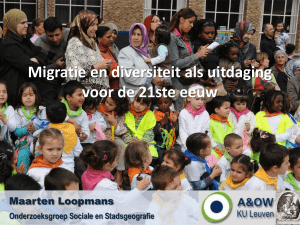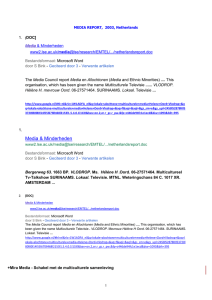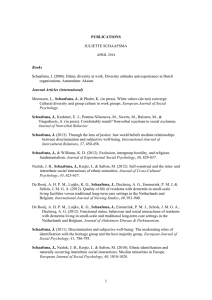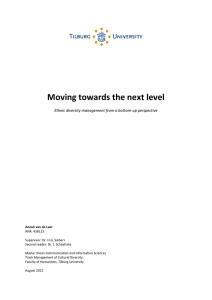wetenschappelijk medewerker Vakgroep Orthopedagogiek
advertisement
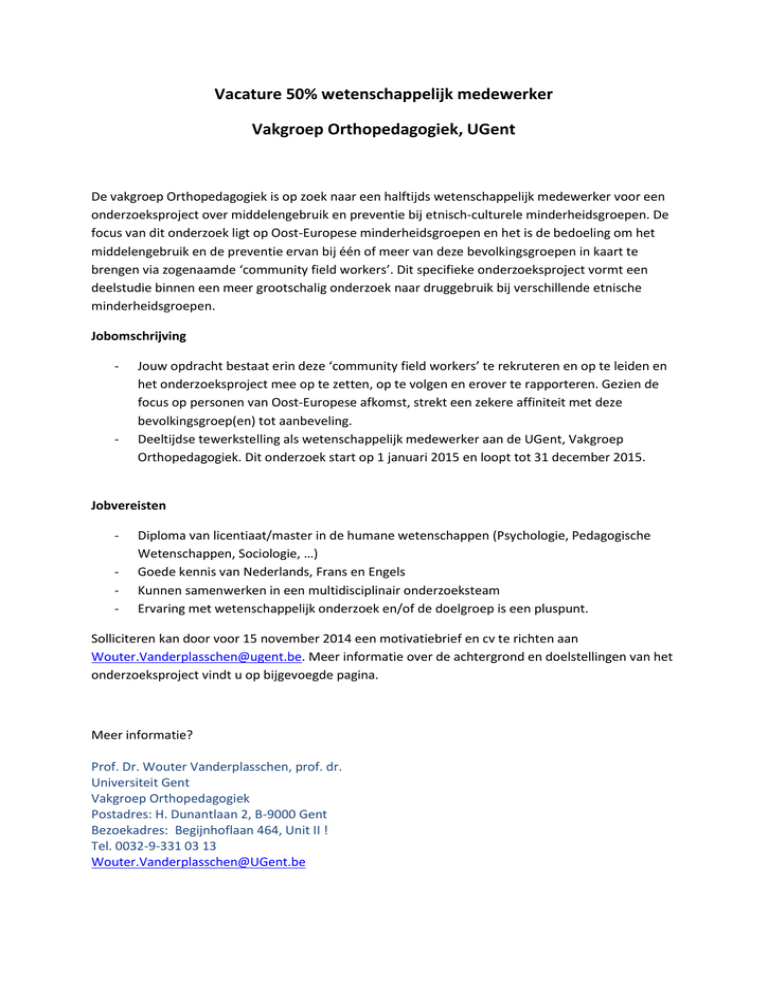
Vacature 50% wetenschappelijk medewerker Vakgroep Orthopedagogiek, UGent De vakgroep Orthopedagogiek is op zoek naar een halftijds wetenschappelijk medewerker voor een onderzoeksproject over middelengebruik en preventie bij etnisch-culturele minderheidsgroepen. De focus van dit onderzoek ligt op Oost-Europese minderheidsgroepen en het is de bedoeling om het middelengebruik en de preventie ervan bij één of meer van deze bevolkingsgroepen in kaart te brengen via zogenaamde ‘community field workers’. Dit specifieke onderzoeksproject vormt een deelstudie binnen een meer grootschalig onderzoek naar druggebruik bij verschillende etnische minderheidsgroepen. Jobomschrijving - - Jouw opdracht bestaat erin deze ‘community field workers’ te rekruteren en op te leiden en het onderzoeksproject mee op te zetten, op te volgen en erover te rapporteren. Gezien de focus op personen van Oost-Europese afkomst, strekt een zekere affiniteit met deze bevolkingsgroep(en) tot aanbeveling. Deeltijdse tewerkstelling als wetenschappelijk medewerker aan de UGent, Vakgroep Orthopedagogiek. Dit onderzoek start op 1 januari 2015 en loopt tot 31 december 2015. Jobvereisten - Diploma van licentiaat/master in de humane wetenschappen (Psychologie, Pedagogische Wetenschappen, Sociologie, …) Goede kennis van Nederlands, Frans en Engels Kunnen samenwerken in een multidisciplinair onderzoeksteam Ervaring met wetenschappelijk onderzoek en/of de doelgroep is een pluspunt. Solliciteren kan door voor 15 november 2014 een motivatiebrief en cv te richten aan Wouter.Vanderplasschen@ugent.be. Meer informatie over de achtergrond en doelstellingen van het onderzoeksproject vindt u op bijgevoegde pagina. Meer informatie? Prof. Dr. Wouter Vanderplasschen, prof. dr. Universiteit Gent Vakgroep Orthopedagogiek Postadres: H. Dunantlaan 2, B-9000 Gent Bezoekadres: Begijnhoflaan 464, Unit II ! Tel. 0032-9-331 03 13 Wouter.Vanderplasschen@UGent.be Patterns of drug use among (ethnic and cultural) minorities Objectives Even though attitudes and practices of ethnic minority groups in Belgium have been extensively studied during the last decade, very little is known about the prevalence of substance use among migrants and people from ethnic minority groups. The use and misuse of alcohol and illicit drugs among ethnic and cultural minorities is an under-researched topic, especially in Europe (Bashford et al., 2004). One of the main reasons is that there are several conceptual and methodological issues that complicate research on ethnicity (Knight et al., 2009) . These issues, combined with the multidimensional nature of drug use, fear of accusations of racism and discrimination and a general lack of minority ethnic health and social care workers and researchers, have created an environment where the theme of ethnicity, drug use and related service provision has been largely neglected. A necessary first step is to establish accurate information on the extent of drug use within different ethnic groups and its possible determinants. This study – re-uniting a multidisciplinary research team (sociology, criminology, special education and social work) that has previously performed the Belspo-funded study on ‘Treatment trajectories of drug users from ethnic minorities’ (ZEMIV-project 2006-2007; Derluyn et al., 2008) - aims to help to fill this gap. The general objective of this study is to contribute to a better understanding of the prevalence and nature of drug use among ethnic and cultural minorities (ECM) in Belgium and its determining factors, to increase community capacity to raise awareness about drug issues within the participants’ own communities (the concept of ‘communities’ is further discussed under), and to assess the needs of the communities and articulate those needs to actors responsible for planning services. To this end, the following specific objectives are set forward: 1) First, we aim to explore the nature and extent of drug use among 4 particular ECM communities in Belgium 2) Second, we aspire to identify possible determinants at the personal, interpersonal, organisational and societal level of substance use and abuse in 4 ethnic communities in Belgium. 3) Third, we aim to assess the needs related to problems of drug abuse in these 4 ECM communities. 3) Fourth, we aim to increase community capacity to raise awareness (knowledge and understanding) about drug-related problems (prevalence, risks and determinants, needs) within the 4 participating communities, and amongst those responsible for planning and delivering services to ECM. 5) Fifth, we aim to include service planners, providers and other key stakeholders in the project from the outset in working with 4 ECM community organisations, in order to further develop services that are sensitive to, and, meet identified needs.
